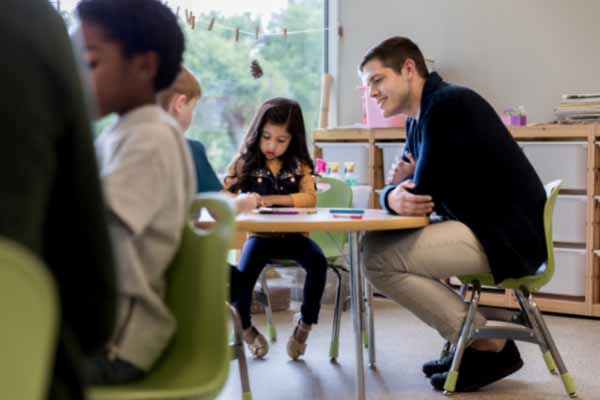
When parents are engaged in their children’s school lives, students have the home support and knowledge they need to not only finish their assignments but also develop a lifelong love of learning. That is why the best predictor of student success is the extent to which families encourage learning at home and involve themselves in their child’s education.
Teachers who also focus on parent engagement often see a profound change in their classrooms. The more parents are involved in their children’s education, the better their entire class’s motivation, behavior, and grades become.
What Does Parental Engagement Look Like?
According to experts, the definition of parent engagement is parents and teachers sharing responsibility to help children learn and meet educational goals. Parent engagement happens when teachers involve parents in school meetings or events, and parents volunteer their support at home and at school. In this way, they make a commitment. Parents commit to prioritizing their child’s educational goals, and teachers commit to listening and providing a space for collaboration with parents.
Parent Engagement VS Parent Involvement
It helps to think of parent involvement as the first step to parent engagement.
Parent involvement is when parents participate in school events or activities, and teachers provide learning resources or information about their student’s grades. Unlike in parent engagement, teachers hold the primary responsibility to set educational goals. They relate to parents not as a partner but an advisor who guides them through academic support for their child.
While teachers can advise parents on some things, parents also have important information about their child that teachers might not know. Both can bring perspectives to the table that enrich a student’s learning experience. Neither is complete without the other. As noted by Larry Ferlazzo in his article “Involvement or Engagement?”: “A school striving for family involvement often leads with its mouth—identifying projects, needs, and goals and then telling parents how they can contribute. A school striving for parent engagement, on the other hand, tends to lead with its ears—listening to what parents think, dream, and worry about.”
Educators should begin by giving parents resources, inviting them to activities, and helping them monitor their children’s progress. Then, partner with them to set goals for their students and find ways to strengthen classrooms. When we engage parents in the learning process, our school communities are all the more enriched for it.
Parent Engagement and Student Success
Children with engaged parents are more likely to:
- Earn higher grades or test scores
- Graduate from high school and attend post-secondary education
- Develop self-confidence and motivation in the classroom
- Have better social skills and classroom behavior
They are also less likely to:
- Have low self-esteem
- Need redirection in the classroom
- Develop behavioral issues
Students aren’t the only ones who benefit from family engagement: parents and teachers do, too. Teachers can prepare parents to help with homework or academic concepts. And engaged parents tend to think highly of teachers, which improves teacher morale. Knowing more about a student’s family life can also help teachers prepare lessons that better fit that student’s needs or interact more efficiently with families. And because students receive more support, classrooms with engaged parents perform better as a whole. When parents and teachers team up, everyone wins!
Parent engagement in after-school activities can also aid in students’ success! Drama Kids International strives to keep families connected by inviting parents to a Parent Participation day: an open class where parents become Drama Kids for a day and participate in all classroom activities. Find out more information by contacting your local Drama Kids today!
